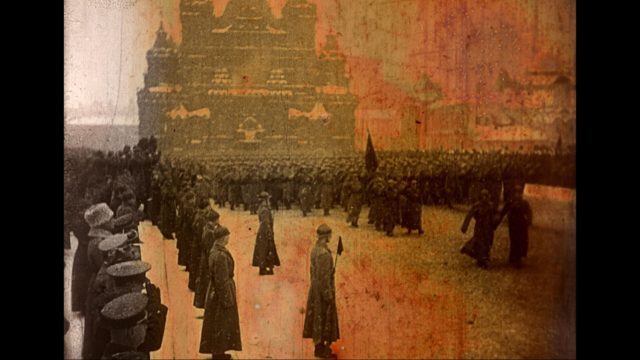
Bill Morrison explores Russian and Soviet cinematic history from a unique angle in The Village Detective
THE VILLAGE DETECTIVE: a song cycle (Bill Morrison, 2021)
IFC Center
323 Sixth Ave. at West Third St.
September 22-30
212-924-777
www.ifccenter.com
In the 1970 documentary Zharov Tells, longtime Russian film favorite Mikhail Zharov says, “Remembering my life, I am trying to follow, to find for myself, and for others too, especially the young, the answer to the question of how life gets woven into art and how art reflects life.” When it comes to cinema, Chicago-born, New York City–based filmmaker Bill Morrison has been excavating this connection for more than thirty years, in such masterworks as Dawson City: Frozen Time and Decasia.
Morrison uses found footage, often in terrible shape, the celluloid practically disintegrating in his hands and before our eyes onscreen, to examine sociocultural issues and film history itself. So when his friend Jóhann Jóhannsson, the Icelandic musician and composer who passed away in 2018 at the age of forty-eight, emailed him in July 2016 about a lobster trawl that had scraped up a film canister, Morrison jumped at the opportunity to explore its contents. Fishing in Faxaflói, about twenty nautical miles southwest of the Snæfellsjökull glacier, near the Mid-Atlantic Ridge where the North American and Eurasian plates meet — what Morrison calls in the film “the deep divide between East and West” — the lobster boat Fróði had scooped up four reels containing an incomplete copy of Ivan Lukinsky’s 1969 Soviet crime comedy Derevenskiy Detektiv (Village Detective), starring Zharov as local rural policeman Fyodor Ivanovich Aniskin, who is investigating the theft of an accordion.
While there is nothing special about the movie, which is not some long-lost treasure but just a mediocre-at-best tale that led to two sequels, Morrison decided to become a kind of detective himself, doing a deep dive into Zharov’s oeuvre, producing a unique look at twentieth-century Soviet and Russian history as seen through its cinema. And he centers his film on the found reels of Derevenskiy Detektiv, with all their glips, blotches, dirt, and grime instead of using a cleaner print (which is available), adding an extra layer of commentary on the changes occurring from multiple revolutions, two world wars, and the transition from tsars to Vladimir Lenin and Joseph Stalin.
Serving as producer, director, and editor, Morrison includes numerous clips of Zharov, who was born in 1899 and died in 1981, having appeared in more than five dozen films and a hundred theatrical productions, beginning with his debut as a soldier in 1915’s Tsar Ivan the Terrible and including 1931’s Road to Life, in which Zharov, as a thief named Zhigan, became the first actor to sing in Russian on camera. Morrison concentrates on the clips themselves; there are only a few moments of commentary, from Erlendur Sveinsson, the former director of the National Film Archive of Iceland who supervised the preservation of the discovered reels, and George Eastman Museum curator Peter Bagrov, who compares Zharov’s popularity to that of Humphrey Bogart or Clark Gable in Hollywood.
“Once you were a prince. Now you are a nobody,” Zharov says as Menshikov to the title character in 1937’s Peter the First. “I am not Soviet,” he declares as Dymba in 1939’s New Horizons. He displays his loyalty to Comrade Stalin as Perchikhin in 1942’s Fortress on the Volga. He plays a former soldier for the tsar who is now a Bolshevik in 1942’s He Will Come Back. The next year, in In the Name of the Fatherland, he proclaims as Globa, “I hate these Bolsheviks. I hate them more than I hate you!” And in Sergei Eisenstein’s 1958 Ivan the Terrible Pt. 2., Zharov states as guard Malyuta Skuratov, “I would give my soul for the tsar.”
The soundtrack, composed by Pulitzer and Grammy winner and Oscar nominee David Lang, also takes us back to old Russia with a sly nod to the plot of Derevenskiy Detektiv; the compelling score was written for one accordion and is played by Norwegian musician Frode Andersen, with vocals by Shara Nova. Not only is the accordion a traditional Eastern European folk instrument but it was used by Tchaikovsky, Sterligov, and others in their orchestrations. The final seconds of the film bring it all together beautifully.
“You know, when I heard about the reels being found, I was expecting a lost silent masterpiece and not a film which we have in our collection on camera negative from which it’s been shown on television from month to month,” Bagrov recounts. Lukinsky’s Derevenskiy Detektiv might not be a masterpiece of any kind, but Morrison’s (The Miners’ Hymns, The Great Flood) The Village Detective is another masterful triumph from one of America’s most ingenious filmmakers.